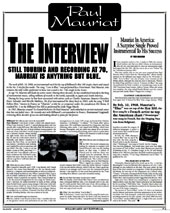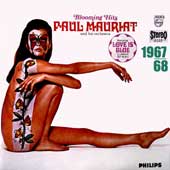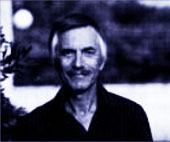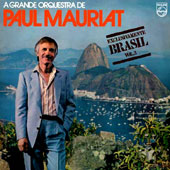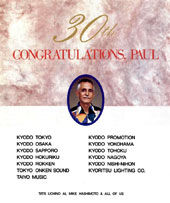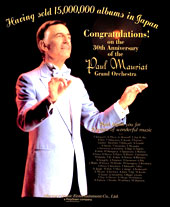INTERVIEW
Billboard magazine - January 20th, 1996 - Emmanuel Legrand
STILL TOURING AND RECORDING AT 70, MAURIAT IS ANYTHING BUT BLUE.
The week of Feb. 10, 1968, an instrumental track hit the top of Billboard's Hot 100 singles charts and stayed in the No. 1 slot for five weeks. The song, "Love Is Blue," was performed by a Frenchman, Paul Mauriat, who remains the only Gallic performer to have ever scored a No. 1 hit single in the States.
At age 70, Mauriat still leads an active career. During three decades, he has established himself as the king of instrumental music, selling millions of records in the world, especially in Japan and South America.
During his long career, he has been associated with artists such as Charles Aznavour, Maurice Chevalier, Henri Salvador and Mireille Mathieu. His first international hit dates back to 1963, with the song "I Will Follow Him," known in France as "Chariot," a title he co-composed under the pseudonym Del Roma. It reached No. 1 on the Billboard Hot 100 as performed by Little Peggy March.
In 1965, Mauriat created "Le Grand Orchestre De Paul Mauriat" and embarked on an international career that has not faded since. He recently met with Billboard's correspondant in France, Emmanuel Legrand, reviewing three decades of success and looking ahead to plans for the future.
Billboard: How did you start out in the music field?
Paul Mauriat: I was lucky to have a father who played music. When I was between 3 and 4, I started playing piano and was quickly able to play full tunes. My father had the wisdom not to show me around like one of those brilliant young puppets. He took care of me, and when I was 8, he gave me music lessons. He was a fantastic teacher, always finding the right words. After my 10th birthday, he sent me to the music school in Marseille, and, before I reached 15, I earned the First Prize. As our family was modest, I decided to start working, and I applied for a job as a postman and was hired. One day, I went to see my father - it was in 1942, and I was 17 - and told him I was offered a job as a band conductor for 250 francs a day, which was more than he earned. He told me to go for it. I still have that contract - my first.
Billboard: When did you move to Paris?
Paul Mauriat: I stayed in Marseille until 1958. I was friends with Franck Pourcel, who comes from Marseille too. He was alreasy established a a composer and instrumentalist as well as a conductor. He really helped me find my way. When I arrived in Paris, I got a job as a band conductor at the Casino in Enghien in the Paris suburbs, where I stayed for six months. Then, Pourcel asked me to do the musical arrangements for two songs for Gloria Lasso. Once I did that, he called everybody he knew in Paris, telling them he had found a great young arranger. I did some work with Quincy Jones while he was in Paris studying with Nodia Boulanger and working for Eddie Barclay as an arranger. Quincy encouraged me to continue. I learned a lot from all these great people, including Barclay, who was a master at his job.
Billboard: Your real breakthrough was Aznavour.
Paul Mauriat: Yes, indeed. I was blessed to know him. I consider him one of the greatest artists and performers of our time. I did the arrangements to some 135 songs performed by Charles Aznavour - "La Boheme," "La Mama," "Tu T'laisse Aller" and so many more. We could have continued for a long time, but I was following other paths. I had signed with Philips, which later became Phonogram, and my career was taking off as an instrumentalist, I was touring all year long, and it came to a point when I had to tell Aznavour I could no longer work with him.
Billboard: When did you start recording on your own?
Paul Mauriat: In 1963. The record company was looking for someone to compete with Franck Pourcel, who was the leading figure at that time. I talked to Franck, and he told me there was enough room for everybody. We are still friends - he is 81 now, and what a wonderful man. This is how I started my recording career as Paul Mauriat. When I signed my contract, I told the record company that I didn't want any artistic director. I wanted to be my own artistic director, which I still am. I had a good reputation as an arranger and I went into the instrumental genre because I was asked to. It was a very busy period for me. I was recording three albums a year and constantly touring.
Billboard: Do you know how many records you've made?
Paul Mauriat: No, frankly, I don't know! But I know I have recorded more than a thousand different titles. A lot of people write to me, asking if I could provide them with some of my old recordings on vinyl. Some have become collector's items. I have tried to keep at least one copy of each record.
Billboard: What's the story behind "Love Is Blue"?
Paul Mauriat: To be honest, I wasn't very fond of the song (the track composed by André Popp with lyrics by Pierre Cour was known in France as "L'amour Est Bleu," was performed by Vicky Leandros and was the Luxembourg entry for the 1967 Eurovision song contest). The song was published by Philips, so I covered it. It was quite an instant hit. In the U.S. a Minneapolis DJ called Alan Mitchell started to play the song and asked the audience to react. He was flooded with phone calls. It quickly took off in the whole country.
Billboard: How did you react when you heard the song was on the U.S. charts?
Paul Mauriat: I couldn't believe it when the president of Philips told me the song was climbing the Billboard charts. I was astounded, because it illustrates quite well the saying that you're never a prophet in your own country, as it has sold less than 30,000 vinyls in France. In the U.S. we sold 2 million singles and 800,000 LPs. The irony was that, in 1967, my contract was about to expire, and someone called (label executive) Lou Reisner and suggested that Philips sign me for an additional three years because he was sure I would score a major hit soon. He was right!
Billboard: Did the success change your life?
Paul Mauriat: Of course it did. But I didn't realize at what time what it meant for me, I was just a name on a listing. And it affected my whole life. But afterwards, I took it as a challenge. I have to prove that I was still able to sell, without the help of a No. 1 hit. Many in the industry said it would be a one-off, but the truth is that I have never stopped recording and selling records. Today, I still sell an average of 800,000 units a year, which by all standards is not bad.
Billboard: Japan looks like your second country. Why is that?
Paul Mauriat: I have performed more than 1,000 concerts there. I like Japan and the Japanese public. I think the Japanese are very romantic, and so am I. I remember being the first to announce all my songs in concerts in Japanese. This is probably why this relationship has lasted so long with these people. Compared to our Western countries, the musical knowledge of Japanese is amazing. Besides, everything there is wonderfully organized. They are very precise and meticulous, which are qualities I enjoy.
Billboard: What is your recording situation right now?
Paul Mauriat: Well, our relationship with PolyGram ended in 1993, and they have the rights to all the back catalog. I have, since January 1994, a contract with Pony Canyon in Japan that covers the Japanese market and Southeast Asia. We hold the rights to the rest of the world. Valentin Coupeau, also handles my business operation, went to Japan and met with the different record companies. At Pony Canyon, they told him, "We want him." So we cut a deal. It is a very dynamic company. The deal with Pony goes through 1997, and we made them a total of six albums. We agree on artistic projects. Everything is recorded in Paris and London, and the final artistic decisions are always mine.
Billboard: How involved are you in the recording of these albums?
Paul Mauriat: Totally involved, and I like it. I choose the songs and the musicians. I conduct the recording sessions. I do the arrangements and I am there for the mixing. I used to do albums covering hit songs, now I am more into theme albums - like music for films, music from a certain period of from a country.
Billboard: Do you still tour?
Paul Mauriat: I had given up touring, because I thought that, at my age, I should take some time to enjoy the pleasures of life, to listen to music. But I missed the joy of living the music onstage and I decided to embark on another tour.
Nothing beats the music onstage. In the next months, I'll tour, I'll finish the album I am recording for a mid-1996 release and then I'll try to keep a mezzo-tempo rhythm to fully live my life.
